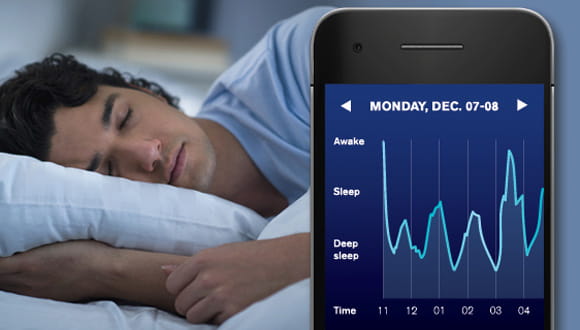Sleep Trackers for Health Monitoring have revolutionized how we understand and improve our sleep. But can these tiny devices really tell you if you’re sleeping well or not?
With more people focusing on overall wellness, tracking sleep has become just as important as tracking steps or calories. So, how much can your sleep tracker really reveal about your health?
These trackers monitor your sleep duration, quality, heart rate, and even breathing patterns. Devices like the Apple Watch, Fitbit, and Oura Ring collect this data and offer insights into sleep habits and possible disorders.
Experts like Dr. Matthew Walker, author of Why We Sleep, emphasize the importance of using this information to make better health decisions.
But that’s just scratching the surface of what sleep tracking can offer. Curious to know which devices stand out and what real benefits they bring to your daily life? Let’s dive into the world of sleep tech and uncover how these trackers can truly impact your health.

Credit: www.amazon.com
Introduction To Sleep Trackers
Sleep trackers are devices that help monitor your sleep patterns. They provide insights into your sleep quality. Understanding your sleep can improve your overall health.
Importance Of Sleep
Sleep is crucial for your health. It helps your body recover and your brain function properly. Lack of sleep can lead to many health problems.
Good sleep can boost your immune system. It also enhances your mood and productivity. Sleep trackers help you understand your sleep cycles better.
Modern Technology
Modern sleep trackers use advanced technology. They can measure your heart rate and movements during sleep. Some even track your breathing patterns.
These devices often sync with your smartphone. This allows you to see detailed reports on your sleep. Some trackers can even suggest ways to improve your sleep quality.
| Feature | Description |
|---|---|
| Heart Rate Monitoring | Tracks your heart rate during sleep. |
| Movement Tracking | Detects movements to analyze sleep stages. |
| Breathing Patterns | Monitors your breathing for sleep apnea. |
- Better Sleep Quality
- Improved Health Insights
- Personalized Sleep Tips
- Wear the tracker to bed.
- Sync with your smartphone.
- Check the data in the morning.

Credit: www.houstonmethodist.org
How Sleep Trackers Work
Sleep trackers are gadgets that help you understand your sleep. They monitor your sleep patterns and provide valuable insights. Many people use them to improve their health. Let’s explore how sleep trackers work.
Types Of Sleep Trackers
There are different types of sleep trackers. Each type has unique features. Here are the main types:
- Wearable Sleep Trackers: These are worn on your wrist or finger. Examples include smartwatches and fitness bands.
- Non-Wearable Sleep Trackers: These are placed under your mattress or pillow. They track your sleep without touching your body.
- Apps: These are mobile apps that use your phone’s sensors. They track your sleep by analyzing movements and sounds.
Data Collection Methods
Sleep trackers use various methods to collect data. The data helps in understanding your sleep quality. Here are some common methods:
| Method | Description |
|---|---|
| Accelerometers | Measure body movements. They help determine sleep stages. |
| Heart Rate Monitors | Track heart rate variations. They indicate different sleep phases. |
| Sound Sensors | Detect snoring and other noises. They help identify sleep disturbances. |
| Temperature Sensors | Monitor body temperature. They provide insights into sleep environment. |
Each method provides valuable data. Combining data from different methods gives a complete picture of your sleep.
Key Features
Sleep trackers offer many features to monitor your health. Each feature provides valuable insights about your sleep patterns and overall well-being. Here are some of the key features you should look for in a sleep tracker.
Sleep Stages
Understanding your sleep stages is crucial for good health. Most sleep trackers divide your sleep into three stages: light sleep, deep sleep, and REM sleep.
- Light Sleep: This is the initial stage of sleep. Your body starts to relax.
- Deep Sleep: The most restorative stage. Your body heals and grows.
- REM Sleep: This stage is for dreaming. Your brain processes information.
Tracking these stages helps you understand your sleep quality. It can also help identify any sleep disorders.
Heart Rate Monitoring
Heart rate monitoring is another essential feature. It allows you to track your heart rate while you sleep. This data can reveal important health information.
Sleep trackers use sensors to measure your heart rate. These sensors provide continuous data throughout the night. Here are some benefits of heart rate monitoring:
- Detects irregular heartbeats.
- Monitors stress levels.
- Tracks overall cardiovascular health.
Having accurate heart rate data can help you make better health decisions.

Credit: www.nationalgeographic.com
Benefits For Health
Sleep trackers are gadgets that help you monitor your sleep. They provide valuable insights into your health. Let’s explore how they benefit your health.
Improved Sleep Quality
Sleep trackers can help you understand your sleep patterns. They monitor your sleep cycles, including deep and REM sleep. By doing so, they provide personalized recommendations to improve your sleep quality.
Here are some ways sleep trackers improve sleep quality:
- Identify sleep disruptions: Trackers show how often you wake up during the night.
- Track sleep duration: They help you know if you are getting enough sleep.
- Monitor sleep stages: Understand the time spent in different sleep stages.
- Provide personalized tips: Get advice on how to improve your sleep routine.
Using this data, you can make changes to your habits. This leads to better sleep and overall health improvement.
Early Detection Of Disorders
Sleep trackers can detect signs of sleep disorders. They can alert you to potential health issues early. This early detection is crucial for timely intervention.
Common disorders that sleep trackers can help identify include:
- Sleep apnea: Trackers can detect irregular breathing patterns.
- Insomnia: They can show if you have trouble falling or staying asleep.
- Restless Leg Syndrome: Trackers can note frequent movements during sleep.
A sleep tracker provides valuable data that you can share with your doctor. This helps in diagnosing and treating sleep-related issues early.
Choosing The Right Tracker
Sleep trackers have become essential tools for monitoring health. Finding the right tracker can improve your sleep and overall well-being. This section will guide you in choosing the perfect tracker based on your needs.
Budget Considerations
Budget plays a crucial role in selecting a sleep tracker. Some trackers are affordable, while others can be expensive. It’s important to find a balance between cost and features.
- Under $50: Basic tracking features like sleep duration and movement.
- $50-$150: Mid-range trackers with additional features like heart rate monitoring.
- Above $150: High-end trackers with advanced features like oxygen levels.
Feature Comparison
Different sleep trackers offer various features. Comparing these features helps in making an informed decision. Below is a table to help you compare some common features.
| Feature | Basic Trackers | Mid-range Trackers | High-end Trackers |
|---|---|---|---|
| Sleep Duration | Yes | Yes | Yes |
| Heart Rate Monitoring | No | Yes | Yes |
| Movement Tracking | Yes | Yes | Yes |
| Oxygen Levels | No | No | Yes |
| Sleep Stages | No | Yes | Yes |
Consider your personal needs and budget. Choose a tracker that offers the most relevant features for you. With the right tracker, you can enjoy better sleep and improved health.
Integrating With Daily Life
Sleep trackers are more than gadgets. They help improve our daily routines. By integrating them into daily life, we can achieve better health. Let’s explore how setting sleep goals and creating healthy habits can enhance our lives.
Setting Sleep Goals
Setting sleep goals is crucial for better sleep. Sleep trackers make this easy. Here’s how:
- Determine your ideal sleep duration.
- Set specific bedtime and wake-up times.
- Track your progress daily.
Use the data from your sleep tracker. Adjust your goals as needed. This helps ensure you get the right amount of sleep.
Creating Healthy Habits
Creating healthy habits is essential for good sleep. Your sleep tracker can guide you:
| Habit | Description |
|---|---|
| Consistent Bedtime | Go to bed at the same time each night. |
| Morning Routine | Wake up at the same time every morning. |
| Limit Screen Time | Avoid screens an hour before bed. |
Follow these simple steps. Track your progress. Improve your sleep quality significantly.
Data Privacy Concerns
Sleep trackers offer great health benefits. But they also raise data privacy concerns. Users worry about how their personal data is handled. Let’s explore these concerns under two key aspects.
Personal Data Security
Users often share sensitive data with sleep trackers. This includes heart rate, movement patterns, and sleep cycles. Keeping this data secure is essential.
Here’s how companies can ensure personal data security:
- Encrypt data during transmission and storage
- Use strong passwords and multi-factor authentication
- Regularly update software to patch vulnerabilities
Data breaches can lead to identity theft. This makes security measures crucial.
Third-party Access
Third-party access to data is another concern. Many sleep tracker apps share data with third parties. These can include health insurance companies and marketing firms.
To protect user data:
- Read the privacy policy before using the app
- Opt out of data sharing options if available
- Choose apps with clear data-sharing policies
Always be cautious about who can access your data.
Here’s a quick overview:
| Concern | Solution |
|---|---|
| Data Security | Encryption, strong passwords, and software updates |
| Third-Party Access | Read policies, opt out, choose transparent apps |
Understanding these data privacy concerns can help users make informed choices.
Future Of Sleep Tracking
The future of sleep tracking looks bright and promising. With rapid advancements in technology, sleep trackers are becoming more accurate. They are now essential tools for health monitoring.
Advancements In Technology
Artificial Intelligence (AI) is enhancing sleep trackers. AI algorithms can analyze sleep patterns more effectively. They provide personalized sleep advice. Wearable devices are now more comfortable and less intrusive.
Smart Home Integration is another exciting development. Sleep trackers can now sync with smart home devices. This integration can adjust room temperature and lighting for better sleep.
Biometric Data Collection is improving. Modern sleep trackers can monitor heart rate, breathing, and body movements. These trackers provide a comprehensive health overview.
| Technology | Benefits |
|---|---|
| Artificial Intelligence | Personalized sleep advice |
| Smart Home Integration | Better sleep environment |
| Biometric Data Collection | Comprehensive health overview |
Potential Health Impacts
Improved Sleep Quality is one major impact. Sleep trackers can identify disturbances. Users can then make necessary adjustments for better sleep.
Early Detection of Health Issues is another benefit. Sleep trackers can detect irregularities in heart rate and breathing. These early warnings can lead to timely medical intervention.
Reduced Stress Levels are possible with better sleep. Good sleep improves mood and reduces stress. Sleep trackers help users achieve this by providing actionable insights.
Overall, the future of sleep tracking is exciting. Advancements in technology and their potential health impacts are significant. These tools are transforming the way we monitor and improve our health.
Frequently Asked Questions
What Is The Most Reliable Sleep Tracker?
The Fitbit Charge 5 is often considered the most reliable sleep tracker. It offers accurate sleep stage tracking and detailed insights.
Are Sleep Trackers Worth It?
Yes, sleep trackers are worth it. They provide valuable insights into sleep patterns. This helps improve sleep quality and health.
Which Smartwatch Brand Offers The Most Accurate Heart Rate Monitoring And Sleep Tracking Features?
Apple Watch is widely recognized for its accurate heart rate monitoring and sleep tracking features. Garmin and Fitbit also offer reliable options.
What Do Doctors Use To Track Sleep?
Doctors use polysomnography to track sleep. This test measures brain waves, oxygen levels, heart rate, and breathing patterns. Wearable devices and home sleep tests are also used for monitoring sleep patterns.
Conclusion
Sleep trackers are valuable tools for enhancing health monitoring. They offer insights into sleep patterns and overall well-being. By using sleep trackers, you can make informed decisions about your lifestyle.
Improved sleep leads to better health and productivity. Invest in a sleep tracker to take control of your health today.

A passionate tech blogger and the founder of Best Tech View, a dynamic platform dedicated to all things technology. With a keen interest in the tech, Ahmad strives to provide insightful and engaging content on the latest tech trends, and breakthroughs.
